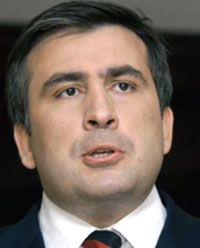Saakashvili calls for early presidential election to stop street protests
Georgian president Mikhail Saakashvili claimed that he calls for early presidential election in January so that opposition leaders would stop street protests against him.

Far fewer police and security troops could be seen in the center of the city - where riot troops clashed with anti-government protesters earlier in the week. On Thursday, Saakashvili called the snap election and promised to quickly lift a state of emergency.
Tbilisi's main avenue reopened for automobile traffic and pedestrians Friday, and only a handful of police patrolled the street.
In an effort to defuse the worst political crisis during his four years in office, Saakashvili offered minor concessions Thursday to the opposition, who are demanding electoral changes that will grant them a greater political role. He had come under sharp criticism from the West - and from Russia.
Salome Zurabishvili, a former foreign minister who now heads the Georgia's Way opposition party, said there was no longer need to hold street protests since Saakashvili had already been weakened.
"The president's speech was equal to resignation," she said.
"We have no plans to take to the streets and organize demonstrations because dialogue (with the authorities) has already begun," said Georgy Khaindrava, a former government minister and now a leader of the National Council on United Opposition.
The crackdown on demonstrators and the state of emergency deeply shocked many Georgians. But while his already sliding popularity is likely to take a toll, Saakashvili can still be expected to win a second term in the Jan. 5 election.
The fragmented opposition lacks the time and resources to mount a serious challenge.
The police violence, the hundreds of troops sent to enforce the state of emergency and the banning of all news broadcasts except those on state-controlled television drew sharp criticism from the West.
Saakashvili has worked to break free from Russia's orbit and integrate Georgia with the West, but his handling of the opposition challenge raised questions about the U.S.-educated president's stated commitment to democracy.
U.S. State Department spokesman Sean McCormack called the state of emergency "a disappointment" and said the United States had called on Saakashvili to "return back to the people the various freedoms that they enjoyed."
NATO Secretary General Jaap de Hoop Scheffer warned that Saakashvili may be jeopardizing Georgia's aspirations to join the alliance.
Saakashvili's televised address Thursday appeared to be an attempt to respond to the criticism and ease tensions while retaining his political clout.
He said he was calling the early presidential election "to gain the trust of the people." He also proposed simultaneously holding a referendum on when to have the next parliamentary elections. The elections had been moved back to late 2008, but the opposition has demanded that they be held earlier in the year as originally scheduled.
Under the constitution, the president is elected for a five-year term and calling an early election would still require parliament's approval. A pro-Saakashvili majority in parliament is expected to quickly endorse his decision.
Saakashvili has expressed a readiness to discuss other measures that the opposition says would make the electoral system more democratic.
Badri Patarkatsishvili, a wealthy Georgian tycoon who has called for ousting Saakashvili, said authorities would try to block other candidates from running. He urged the opposition to unite around a powerful figure and seek to transfer more powers to parliament.
The political crisis is the worst Saakashvili has faced since being ushered into power almost four years ago after peaceful street protests known as the Rose Revolution.
Many Georgians support his efforts to shake off Russia 's influence and take the small Caucasus nation into the European Union and NATO, but critics also accuse him of sidestepping the rule of law and failing to move fast enough to spread growing wealth. The average monthly pension remains at about US$30 ( EUR 20).
The disillusionment fed the latest rounds of protests, which began Nov. 2 with about 50,000 people gathering outside parliament.
On Wednesday, riot police advanced toward the protesters, pushing people back with shields and beating some with truncheons. They fired tear gas and rubber bullets.
Nearly 600 people sought medical treatment after the clashes, including two dozen police officers, and 32 protesters were detained.
Saakashvili accused Moscow of fomenting the unrest and expelled three Russian diplomats. Russia , which denied the accusations, responded by expelling three Georgian diplomats.
Subscribe to Pravda.Ru Telegram channel, Facebook, RSS!


